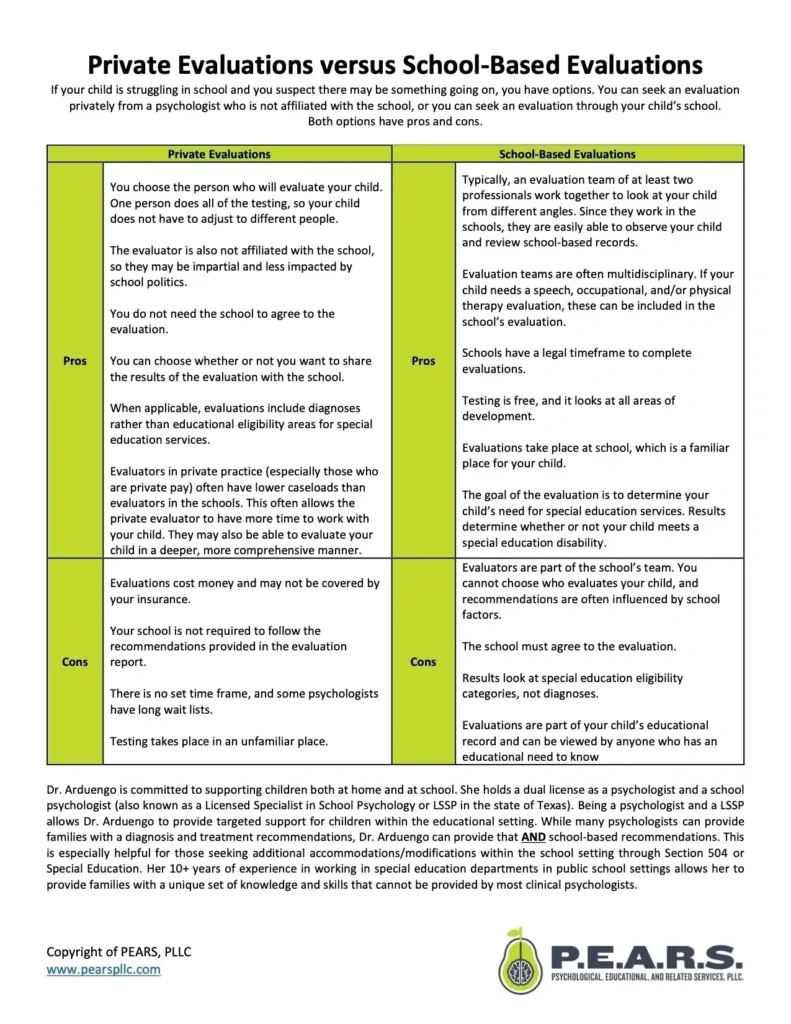Educational Evaluations Basics with Heather Arduengo PhD, LP, LS
Many parents feel overwhelmed when it comes to the ins and outs of educational evaluations for their child. That is why the Multisensory Reading Center has partnered with PEARS, PLLC -Psychological, Educational, and Related Services to help shed light on the topic. Learn more about the basics of educational evaluations in this community spotlight.
Q: First, tell us about yourself
A: Hi! My name is Heather Arduengo, and I am a Licensed Psychologist and Licensed Specialist in School Psychology. I have worked and trained in a variety of settings, including a number of school districts within the DFW metroplex for over a decade. I have also worked in private practice and hospital settings, and I have served as an Adjunct Professor for the School Psychology program at Texas Woman’s University. I have a wide range of experiences in working with children who have unique educational needs, including those with Autism, ADHD, depression, anxiety, and other emotional and/or behavioral challenges. Her specialty includes finding ways to help children reach their highest potential within the school setting.
Q: Why are educational evaluations important?
A: Educational evaluations can help you better understand your child’s individual strengths and weaknesses, as well as how those strengths and weaknesses impact their ability to be successful within the educational setting.
Q: What are the signs that indicate my child needs an evaluation?
A: Low or failing grades are one reason you may pursue an evaluation. Learning difficulties can present in other ways as well. Your child may struggle with attention or focus. They may engage in work-avoidance behaviors. They may make comments, such as “I am dumb” or “I hate school.” There are a number of ways children may try to “hide” their weaknesses.
Q: As a parent considering an evaluation for my child, what can I expect with the process?
A: Evaluations with me are usually completed in three parts. The first appointment is an intake appointment with just the parents, where I will collect a variety of information about your child. The second appointment will be the direct testing appointment, where I will spend one-on-one time with your child and gather formal and informal information based on your concerns. The third and final appointment will be the feedback/results appointment where I will review the results of my evaluation with you and give you a chance to answer any questions you have.
Q: What is a common misconception that parents have about private evaluations?
A: Parents often worry about evaluators “just checking the boxes.” While psychologists are looking for a specific set of criteria to make a diagnosis, my evaluations will be comprehensive and include information from a variety of sources.
Q: What happens after an evaluation?
A: You are provided with a copy of the evaluation report as well as a list of recommendations. Because I hold a dual license as a psychologist as well as a Licensed Specialist in School Psychology, I often provide recommendations for both the home and school setting.
Q: How do private evaluations differ from school evaluations?
A: Private evaluations provide parents with diagnoses (when applicable) whereas educational evaluations look at educational eligibility categories. When trying to decide between a private evaluation and a school-based evaluation, it is helpful to review the pros and cons of both. [see attached PDF]

